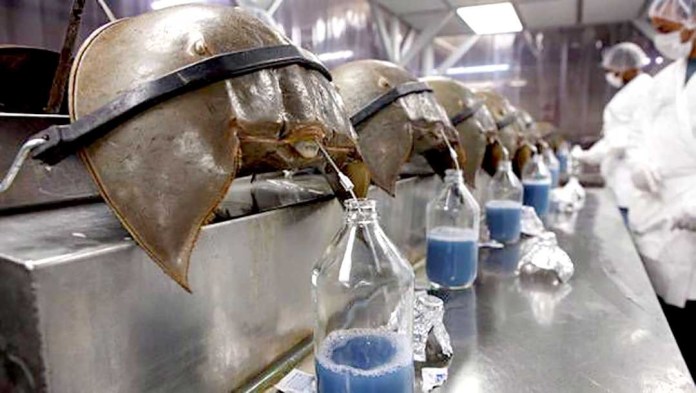Dwindling in numbers and on the brink of extinction, horseshoe crabs could soon become an indirect victim of the COVID-19 vaccine.
Horseshoe crabs have long been a feature of vaccination research. Their blue blood, used to test the safety of vaccinations and other medial products, is “able to detect endotoxins—a substance released by bacteria when they die,” EuroNews reported. Since endotoxins can kills humans if entered into the bloodstream, harvesting these ancient crabs for medical research remains prevalent.
“The one thing people have to know is that the horseshoe crab has touched everyone’s life no matter where you live,” Allen Burgenson, a global expert in biomedicine working for Lonza Pharma and Biotech, said. They are responsible for maintaining human health around the world.”
Once harvested, the crabs are typically drained alive, often with the hope that they will live “long enough to regenerate blood for further testing,” EuroNews reported.
“Each sensitive crab is mounted onto a rack, a needle is inserted into the tissue around their heart, and their blood is drained,” Dr Julia Baines, PETA’s science policy manager, said. “An estimated 50,000 of them die in the process and human interference also means that the species is now vulnerable to extinction.”
Conservationists said the harvesting of wild animals for biomedical research is unsustainable and, with the horseshoe crab on the brink of extinction because of their bait and biomedical likeness, they are asking the biomedical industry to start relying on a synthetic alternative immediately.
rFC, developed in the 1980s, is a synthetic equivalent to horseshoe crabs’ blood, but the United States pharmaceutical industry continues to renew its backing for horseshoe crab blood. And with millions of doses of a potential COVID-19 vaccine needed world-wide, animal rights activists and conservationists are trying to bring this “growing crisis” to public attention before it’s too late.
“Despite years of conservation work by government entities and non-profits who care about the health of our shoreline ecosystems, we are not seeing the results we need. Action must be taken now, or species like the horseshoe crab will disappear from our landscape forever.”
Related posts:
Views: 0
 RSS Feed
RSS Feed

















 October 11th, 2020
October 11th, 2020  Awake Goy
Awake Goy 

 Posted in
Posted in  Tags:
Tags: 
















